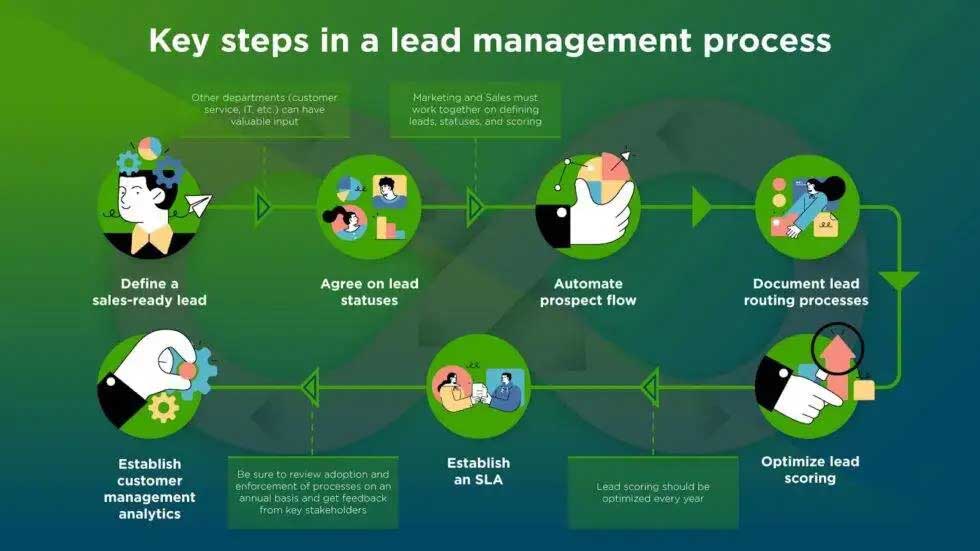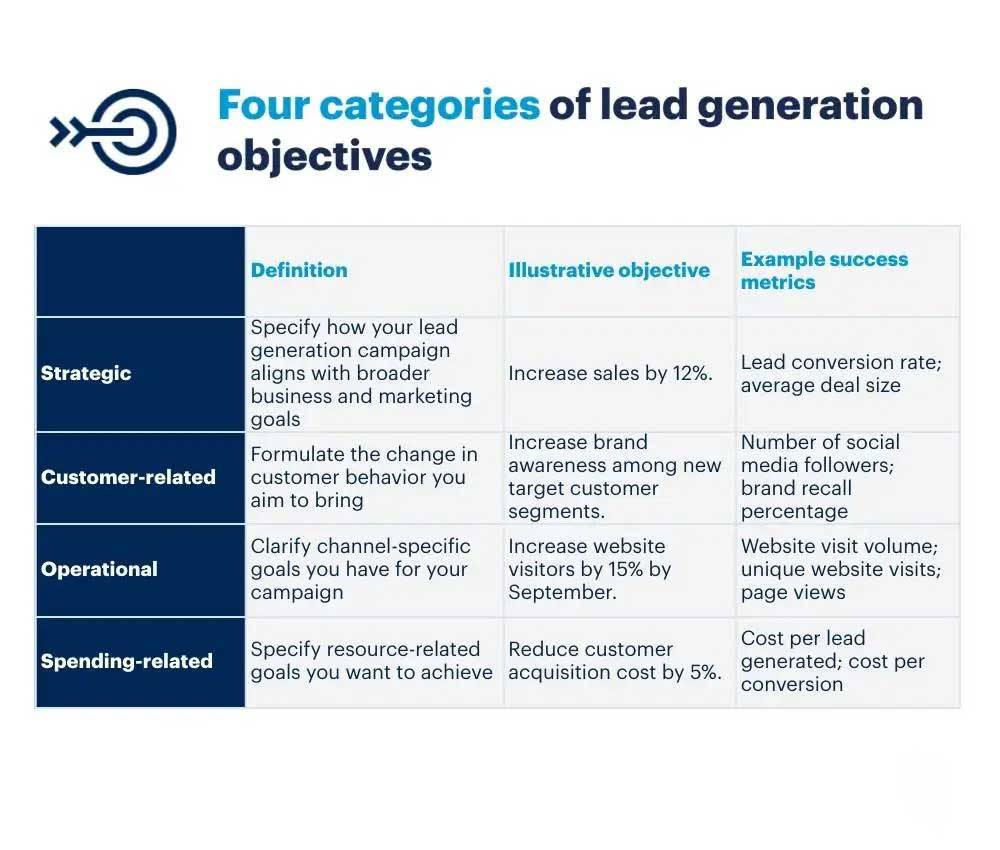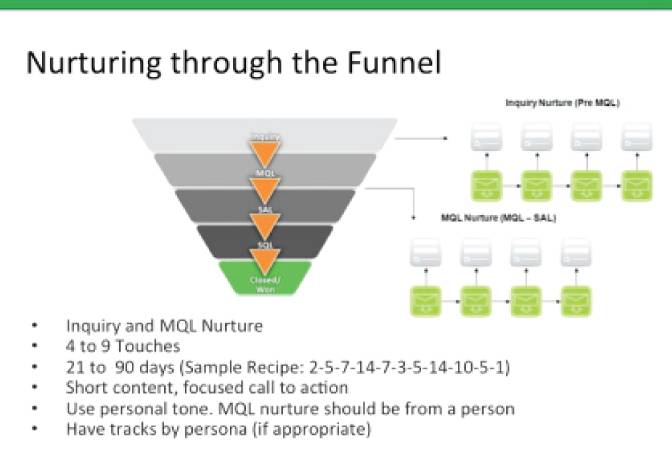Introduction
The importance of generating qualified leads for business success
Generating qualified leads is essential for the success of any business. Qualified leads are potential customers who have shown interest in your product or service and are more likely to make a purchase. These leads are valuable because they have already demonstrated a need for what you offer and are actively seeking a solution. By focusing on generating qualified leads, you can save time and resources by targeting your marketing efforts towards those who are most likely to convert into paying customers. This blog post will discuss effective strategies for generating qualified leads and maximizing your business’s success.

Source: www.pedowitzgroup.com
Understanding Your Target Market
Identifying and researching your target market
To generate qualified leads for your business coaching services, it’s crucial to have a deep understanding of your target market. Here are some steps to help you identify and research your target market:
- Define your target audience: Start by clearly defining your ideal clients. Consider demographics such as age, gender, location, industry, and job title. This will help you narrow down your focus and develop tailored marketing strategies.
- Conduct market research: Use surveys, interviews, and online research to gather information about your target audience. Identify their pain points, goals, and challenges related to business coaching. This will enable you to position your services effectively and address their specific needs.
- Analyze competition: Take a look at your competitors who are targeting the same audience. Identify their strengths, weaknesses, and unique selling propositions. This will help you differentiate yourself and create a compelling value proposition.
- Segmentation: Once you have gathered sufficient data, segment your target market into smaller groups based on common characteristics or needs. This will allow you to personalize your marketing messages and tailor your offerings to specific segments.
Remember, understanding your target market is an ongoing process. Regularly review and update your research to stay ahead of changing trends and preferences. By truly understanding your target market, you will be able to attract qualified leads and grow your business coaching practice.

Source: visme.co
Developing an Ideal Customer Profile
Creating a detailed ideal customer profile to guide your lead generation efforts
When it comes to generating qualified leads for your business coaching services, having a clear and detailed ideal customer profile is essential. This profile helps you understand your target audience, their needs, and how you can best serve them. Here are some steps to help you develop an ideal customer profile:
- Research your existing clients: Look at your current client base and identify common characteristics such as industry, job title, company size, and pain points. This will give you insights into the type of clients you are already serving effectively.
- Conduct market research: Use surveys, interviews, and other research methods to gather information about your target market’s demographics, psychographics, and behaviors. This data will help you create a comprehensive profile of your ideal customer.
- Identify their goals and challenges: Understand your target audience’s goals and challenges in their business or career. This will enable you to position your coaching services as solutions to their specific needs.
- Consider their decision-making criteria: Determine the factors your ideal customers consider when choosing a business coach. These may include price, experience, testimonials, or specific coaching methodologies. Understanding their decision-making criteria will help you tailor your marketing messages to resonate with them.
- Create a detailed ideal customer profile: Compile all the information you have gathered into a comprehensive ideal customer profile. This profile should include demographic information such as age, gender, and location, as well as psychographic information such as values, beliefs, and motivations.
By developing an ideal customer profile, you can align your lead-generation efforts with the needs and preferences of your target audience. This targeted approach will increase the quality of leads you generate and improve your chances of converting them into paying clients. To learn more about lead generation strategies and techniques, visit this Wikipedia page.

Source: emtemp.gcom.cloud
Creating High-Quality Content
The role of content marketing in generating qualified leads
Creating high-quality content is essential for attracting and engaging potential customers. By providing valuable and relevant information, businesses can establish themselves as industry experts and build trust with their target audience. Here are some key points to consider when using content marketing to generate qualified leads:
1. Identify your target audience: Before creating content, it’s crucial to identify and understand your target audience. This will help you tailor your content to their needs and preferences.
2. Develop a content strategy: A well-defined content strategy will provide direction and ensure consistency in your content creation efforts. It should include topics, keywords, and a content calendar to keep you organized.
3. Create valuable and informative content: Focus on creating value for your target audience. This can include educational blog posts, informative videos, helpful guides, or industry insights. The more valuable your content, the more likely it is to attract qualified leads.
4. Optimize your content for search engines: To reach a wider audience, optimize your content for search engines by using relevant keywords, meta tags, and descriptive headings. This will increase the visibility of your content in search engine results pages.
5. Promote your content: Once you’ve created high-quality content, promoting it through various channels is essential. This can include social media, email marketing, guest blogging, or influencer partnerships. The more exposure your content gets, the more potential leads it can generate.
6. Measure and analyze your results: Regularly monitor and analyze the performance of your content to determine what’s working and what’s not. This will allow you to make data-driven decisions and optimize your content strategy for better results.
By focusing on creating high-quality content that resonates with your target audience, you can attract and generate qualified leads for your business. Remember to continuously evaluate and improve your content strategy to stay relevant and ahead of the competition.
For more information on content marketing and lead generation strategies, visit this Wikipedia page.

Source: assets.mailshake.com
Optimizing Your Website for Lead Generation
Effective strategies for optimizing your website to capture leads
Optimizing your website is key when it comes to generating qualified leads for your business coaching services. This will ensure potential clients find your website easily and are compelled to act. Here are some effective strategies to optimize your website for lead generation:
1. Clear and compelling call-to-action: Place a clear and visible call-to-action on your website’s homepage and key landing pages. This could be a button that prompts visitors to sign up for a free consultation or download a valuable resource.
2. Lead capture forms: Include lead capture forms throughout your website, allowing visitors to provide their contact information in exchange for valuable content or resources. Keep the forms simple and easy to fill out to increase conversions.
3. Valuable content and resources: Offer valuable content on your website, such as e-books, whitepapers, or case studies, that visitors can download in exchange for their contact information. This establishes your expertise and provides value to potential clients.
4. Testimonials and success stories: Showcase testimonials and success stories from your past clients on your website. This builds trust and credibility, making visitors more likely to reach out and become leads.
5. Search engine optimization (SEO): Optimize your website for search engines by using relevant keywords and meta tags. This will help your website rank higher in search results, increasing its visibility and attracting more qualified leads.
6. Mobile optimization: Ensure that your website is mobile-friendly and responsive. With more people accessing the internet through mobile devices, having a mobile-optimized website is crucial for capturing leads.
7. Live chat or chatbot: Implement a live chat or chatbot feature on your website to engage with visitors in real-time and answer their questions. This personal touch can improve user experience and generate more leads.
By implementing these strategies, you can optimize your website for lead generation and attract more qualified leads for your business coaching services. Remember to continually track and analyze your website’s performance to make necessary improvements and drive even more conversions.
Utilizing Social Media Marketing
Utilizing social media platforms to attract and engage potential leads
Social media marketing has become essential for businesses to generate qualified leads. With billions of users worldwide, platforms such as Facebook, Instagram, Twitter, and LinkedIn offer businesses a vast audience to target and engage with. Here are some tips on utilizing social media marketing to generate qualified leads:
1. Identify your target audience: Before diving into social media marketing, it’s crucial to identify your target audience. Understand their demographics, interests, and pain points to create content that resonates with them.
2. Create engaging content: Produce high-quality and engaging content that provides value to your target audience. This can include informative blog posts, videos, infographics, and live streams. Use compelling visuals, captivating headlines, and relevant hashtags to increase visibility and attract potential leads.
3. Use lead generation tools: Many social media platforms offer lead generation tools that allow businesses to collect contact information directly from their target audience. Utilize these tools to create lead capture forms, landing pages, and call-to-action buttons to encourage lead generation.
4. Engage with your audience: Social media is all about building relationships and engaging with your audience. Respond to comments, messages, and inquiries promptly and professionally. Encourage discussions, ask questions, and seek feedback to foster two-way communication.
5. Leverage influencers: Collaborate with influencers or industry experts to promote your business and reach a wider audience. Their endorsements and recommendations can significantly impact lead generation and brand awareness.
6. Run targeted ad campaigns: Social media platforms offer advanced targeting options to reach specific demographics, locations, interests, and behaviors. Create targeted ad campaigns to reach potential leads who fit your ideal customer profile.
Remember to track and analyze the performance of your social media marketing efforts. Monitor key metrics such as engagement, reach, click-through rates, and conversions to identify the most effective strategies in generating qualified leads. With a strategic approach and consistent effort, social media marketing can be a powerful tool to generate qualified leads for your business.

Source: demandgen.com
Implementing Email Marketing Campaigns
Creating and optimizing email marketing campaigns to nurture leads
Email marketing is a powerful tool for business coaches to nurture their leads and turn them into qualified prospects. By delivering valuable content directly to their inboxes, coaches can build a relationship with their audience and establish themselves as experts in their field. Here are some tips for creating and optimizing successful email marketing campaigns:
- Segment your email list: Divide your email list into different segments based on their interests, needs, or stage of the buyer’s journey. This allows you to tailor your content and offers to specific groups, increasing the relevance and effectiveness of your emails.
- Personalize your emails: Use merge tags to personalize your emails with the recipient’s name and other relevant information. Personalized emails are more likely to grab attention and create a connection with the reader.
- Provide valuable content: Your emails should offer valuable insights, tips, and resources that are relevant to your target audience. This positions you as a trusted source of information and keeps your subscribers engaged.
- Use compelling subject lines: Your subject line is the first thing your subscribers see, so make it attention-grabbing and enticing. A compelling subject line increases the open rate of your emails and encourages readers to click through.
- Optimize for mobile: With the increasing use of smartphones, ensuring that your emails are mobile-friendly is essential. Use a responsive design that adapts to different screen sizes, making it easy for subscribers to read and engage with your content on their mobile devices.
- Test and analyze your campaigns: Regularly test different elements of your email campaigns, such as subject lines, call-to-action buttons, and email layouts. Analyze the results to see what works best for your audience and make data-driven decisions to optimize your future campaigns.
By implementing these strategies, business coaches can effectively leverage email marketing to generate qualified leads and move them closer to becoming paying

Source: www.leadfuze.com
Networking and Relationship Building
The power of networking and building meaningful relationships to generate qualified leads
Networking and relationship building play a vital role in generating qualified leads for your business coaching success. Connecting with others in your industry and building meaningful relationships can expand your network, gain valuable insights, and attract potential clients. Here are some key strategies to maximize the power of networking:
1. Attend industry events: Networking events, conferences, and seminars provide opportunities to meet like-minded professionals and establish connections. Make sure to engage in conversations, exchange contact information, and follow up afterward.
2. Join professional organizations: Become a member of industry-specific associations or organizations. These groups often hold regular meetings and events that allow you to meet potential clients and collaborators.
3. Leverage social media platforms: LinkedIn, Facebook, and Twitter can be valuable tools for networking. Join relevant groups, participate in discussions, and share insightful content to showcase your expertise and attract potential leads.
4. Build genuine relationships: Focus on building meaningful connections rather than simply pushing for sales. Take the time to get to know others, understand their needs, and offer support. Establishing trust and credibility increases the likelihood of receiving referrals and qualified leads.
5. Offer value to your network: Share your industry knowledge, provide tips and insights, and offer assistance whenever possible. By demonstrating your expertise and generosity, you position yourself as a valuable resource, making others more likely to recommend your services.
Remember, networking is an ongoing process. Continuously nurture your relationships, stay active in relevant communities, and always be open to new opportunities. Investing time and effort into networking and relationship building can generate a steady stream of qualified leads for your business coaching success.

Source: www.pagetraffic.com
Leveraging Referrals and Customer Testimonials
Harnessing the power of referrals and customer testimonials to generate qualified leads
Referrals and customer testimonials are powerful tools that can help businesses generate qualified leads. When potential customers hear positive feedback from existing customers, they are more likely to trust and engage with a business. Here are some strategies for leveraging referrals and customer testimonials to generate qualified leads:
- Encourage referrals: Offer incentives or rewards to customers who refer others to your business. This can be in the form of discounts, freebies, or exclusive offers.
- Provide exceptional customer service: By providing exceptional customer service, you increase the chances of receiving positive referrals and testimonials from satisfied customers.
- Create a referral program: Implement a formal referral program that makes it easy for customers to refer others to your business. This can be done through a dedicated referral portal or by providing referral cards.
- Display customer testimonials: Showcase positive customer testimonials on your website, social media platforms, and other marketing materials. This helps build trust and credibility with potential customers.
- Offer social proof: Encourage customers to leave reviews on popular review platforms such as Google, Yelp, and Facebook. Positive reviews act as social proof and can influence potential customers’ decision-making process.
Businesses can effectively generate qualified leads and build a strong customer base by harnessing the power of referrals and customer testimonials.

Source: www.cience.com
Implementing Lead Generation Automation Tools
Exploring automation tools and technologies to streamline your lead generation efforts
Generating qualified leads is a crucial aspect of any successful business coaching venture. To maximize your lead generation efforts and save time, exploring automation tools and technologies is essential. These tools can help you streamline your lead generation process and ensure you are effectively targeting the right audience. Here are some automation tools to consider:
1. Customer Relationship Management (CRM) Software: CRM software helps you track and manage leads throughout the entire customer journey. It allows you to capture and store lead information, track interactions, and nurture leads through automated workflows.
2. Email Marketing Automation: Email marketing automation platforms enable you to create and send targeted emails to your leads. You can set up automated email sequences based on user behavior, segment your audience, and personalize your messages to increase engagement and conversions.
3. Social Media Automation: Social media automation tools allow you to schedule and publish posts across multiple platforms, monitor conversations, and engage with your audience. You can also use these tools to track social media metrics and analyze the effectiveness of your lead generation campaigns.
4. Landing Page Builders: Landing page builders help you create visually appealing and conversion-focused landing pages without the need for coding skills. These tools offer pre-designed templates and allow you to customize your landing pages to capture lead information effectively.
5. Lead Generation Chatbots: Chatbots can engage with website visitors, answer their questions, and collect lead information. They can qualify leads, segment them based on their interests, and pass them along to your sales team.
Implementing these lead-generation automation tools can significantly enhance your lead generation efforts and increase your chances of generating qualified leads for your business coaching services. By automating repetitive tasks, you’ll have more time to build relationships with your leads and provide valuable coaching services
Tracking and Analyzing Results
Measuring and analyzing the effectiveness of your lead generation strategies for continuous improvement
Tracking and analyzing the results of your lead generation strategies is crucial for the success of your business coaching efforts. By measuring the effectiveness of your strategies, you can identify what is working well and what needs improvement. Here are some steps to help you track and analyze your lead generation results:
- Define your key performance indicators (KPIs): Determine the metrics that are most important to your business, such as the number of leads generated, conversion rates, and return on investment (ROI).
- Implement tracking tools: Use tools like Google Analytics or CRM systems to track the performance of your lead generation activities. Set up tracking codes and tags to monitor website visits, form submissions, and other relevant actions.
- Analyze the data: Regularly review the data collected from your tracking tools. Look for trends, patterns, and areas of improvement. Identify which strategies generate the most qualified leads and which are underperforming.
- Test and optimize: Based on your analysis, make adjustments to your lead generation strategies. Experiment with different approaches, such as changing your call-to-action, targeting different audiences, or optimizing your landing pages. Continuously test and refine your strategies to improve your results.
- Monitor ROI: Keep track of the financial impact of your lead generation strategies. Calculate your ROI by comparing the cost of your marketing efforts to the revenue generated from your converted leads. This will help you identify the most effective strategies and allocate your resources more efficiently in the future.
By consistently tracking and analyzing your lead generation results, you can identify areas for improvement and make data-driven decisions to optimize your strategies. This will ultimately help you generate more qualified leads and achieve greater success in your business

Source: experts.chevaun.com
Conclusion
Key takeaways and tips for generating qualified leads for business coaching success
In conclusion, generating qualified leads is essential for the success of your business coaching. Here are some key takeaways and tips to help you generate qualified leads and drive business growth:
- Define your target audience: Clearly identify your ideal clients’ demographics, interests, and pain points. This will allow you to tailor your marketing and lead generation efforts effectively.
- Develop a strong online presence: Create a professional website showcasing your expertise and your coaching services’ benefits. Optimize your website for search engines to increase visibility and attract organic traffic.
- Offer valuable content: Create informative blog posts, videos, and social media content that provide insights and solutions to your target audience’s challenges. Offer free resources such as e-books or webinars to capture leads and build trust.
- Use social media platforms: Build a presence on platforms such as LinkedIn, Facebook, and Twitter to connect with potential clients and share valuable content. Engage in conversations and join relevant groups to expand your network.
- Implement lead generation strategies: Use lead magnets, such as free consultations or assessments, to capture contact information from interested prospects. Offer exclusive discounts or incentives to encourage sign-ups.
- Nurture leads through email marketing: Once you have captured leads, create an email marketing campaign to stay connected and provide value. Send regular newsletters, updates, and offers to keep your coaching services top of mind.
- Build strategic partnerships: Collaborate with complementary businesses or influencers in your industry to expand your reach and tap into their networks. To generate qualified leads, consider joint webinars, guest blogging, or co-hosted events.
- Track and measure your efforts: Use analytics and tracking tools to monitor the success of your lead generation strategies. Identify what works and refine your approach to optimize results.
Remember, generating qualified leads takes time and effort. It’s important to consistently implement these strategies and adapt them based on your target audience’s feedback and preferences. With a well-executed lead generation plan, you can attract high-quality leads and achieve business coaching success.



